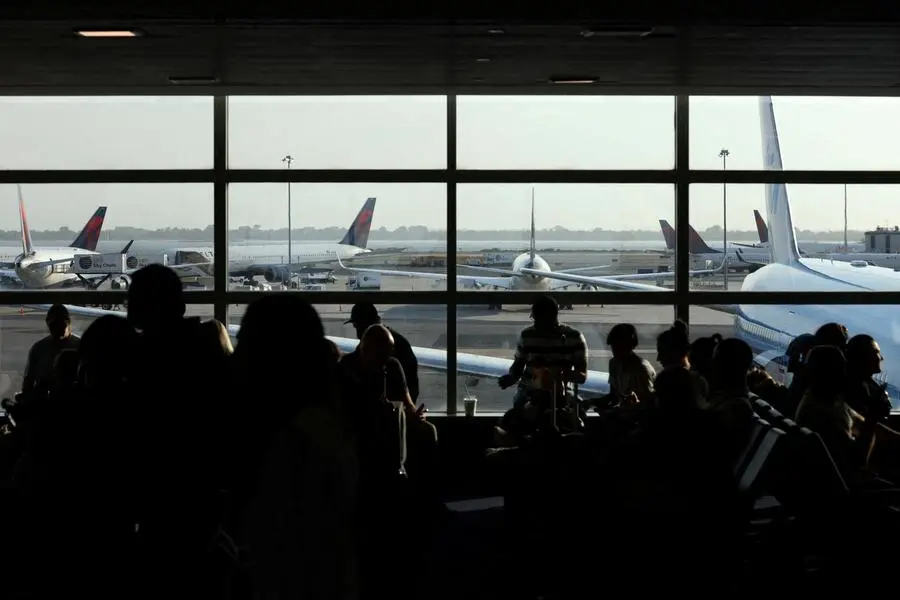PHOTO
A dangerously frigid arctic air mass gripped a vast expanse of the United States on Thursday as a looming winter storm of historic proportions threatened to upend travel plans for millions of Americans.
Leading into the holiday weekend, the impending storm was expected to bring blizzard conditions to the Great Lakes region, heavy rains followed by a flash freeze on the East Coast, wind gusts of 60 miles per hour (100 kph) and bitter cold as far south as the Mexican border.
As the storm took shape over the Great Lakes on Thursday, a weather phenomenon known as a bomb cyclone was likely to develop from a "rapidly deepening low-pressure" system, the National Weather Service (NWS) said.
The cyclone could spawn snowfalls of a half inch (1.25 cm) per hour and howling winds from the Upper Midwest to the interior Northeast, producing near-zero visibility, the weather service said.
Combined with the arctic cold, wind-chill factors as low as 40 degrees below zero Fahrenheit (minus 40 Celsius) were forecast in the High Plains, the northern Rockies and Great Basin, the NWS said. Exposure to such conditions without adequate protection can cause frostbite within minutes.
Power outages were likely from high winds, heavy snow and icy conditions, combined with overall higher energy demands, and the storm was expected to make travel virtually impossible at times.
The extreme cold posed a particular hazard to livestock in the ranching-intensive region. Tyson Foods Inc, the nation's leading meat producer by sales, said it had scaled back operations to protect employees and animals.
"It's dangerous and threatening," President Joe Biden said at the White House, urging Americans with travel plans to not delay and to set off on Thursday. "This is not like a snow day, when you were a kid, this is serious stuff."
By afternoon, well over half of the Lower 48 states, from Washington state to Florida, were under wind-chill alerts and other winter weather advisories affecting more than 200 million people, or roughly 60% of the U.S. population, the weather service reported.
The NWS map of looming weather hazards on Thursday, stretching from border to border and coast to coast, "depicts one of the greatest extends of winter weather warnings and advisories ever," the agency said.
'WHITE-OUT' CHRISTMAS
The storm front could bring more than a foot (30 cm) of snow to some areas as it moves eastward out of the Plains and Great Lakes, weather service meteorologist Ashton Cook said. Snow squalls were expected from Illinois to Indiana, and could produce white-out conditions.
The American Automobile Association estimates 112.7 million people planned to travel 50 miles (80 km) or more from home between Dec. 23 and Jan. 2, up 3.6 million travelers over last year and closing in on pre-pandemic numbers.
More than 4,500 U.S. flights scheduled for Thursday and Friday have been canceled, with two major airports in Chicago accounting for over 1,200 of the cancellations, according to flight-tracking service FlightAware.
"They're ruining Christmas," Nadia Dickens, 42, a management company worker in Gallatin Tennessee, said on Thursday after her flight from Nashville was scrubbed.
She was headed for Corpus Christi, Texas, for a Christmas Day family gathering where she looked forward to making tamales with her 94-year-old grandmother. Dickens booked another flight to Austin, Texas, after a relative offered to make the four-hour drive to get her to the family reunion, but she remained pessimistic.
"We're going to get an inch of snow overnight and the weather is just dreadful all over the place," she said.
The frigid air mass that first enveloped northern states was pushing south through central Oklahoma and northwestern Texas, where the mercury plunged to single digits on Thursday.
Hundreds of Texans died in February 2021 after the state's power grid failed amid wintry storms, leaving millions without electricity. The Electric Reliability Council of Texas (ERCOT), which has since worked to safeguard its grid, "expects sufficient generation to meet forecasted demand at this time," spokesperson Christy Penders said.
Temperatures in the Southern Plains and Southeast could stay below freezing, 30-plus degrees less than normal, for multiple days, the NWS predicted.
Greg Carbin, chief of forecast operations at the NWS Weather Prediction Center in Maryland, said freezing or below-freezing cold would bisect central Florida, with temperatures about 25 degrees below normal.
Motorists in the Ohio and Tennessee valleys were warned that wet roads could instantly freeze over as temperatures fell.
The NWS also warned of freezing rain in parts of Oregon and Washington in the Northwest, where a separate storm was forming on Thursday.
Georgia on Wednesday joined North Carolina and Kentucky in declaring states of emergency. Temperatures in north Georgia were forecast to hit 10F (minus 12C) with subzero wind chills.
"We are expecting weather we haven't seen in a decade or more," Georgia Governor Brian Kemp told a media briefing.
Brandon Mattis, 24, said his flight from New York City to Atlanta was canceled on Thursday due to the coming storm, leaving him "flustered" at LaGuardia Airport in Queens.
Mattis said he searched for alternate routes and was even considering a 21-hour bus ride to Atlanta.
"Anything we can do just to get there, we're going to do," he said. (Reporting by Tyler Clifford in Detroit and Rich McKay in Atlanta; Additional reporting by Steve Gorman, Laila Kearney, Lisa Baertlein, Julia Harte, Nandita Bose, Scott DiSavino, Tom Polansek and PJ Huffstutter; editing by Jonathan Oatis, Sandra Maler & Shri Navaratnam)





















